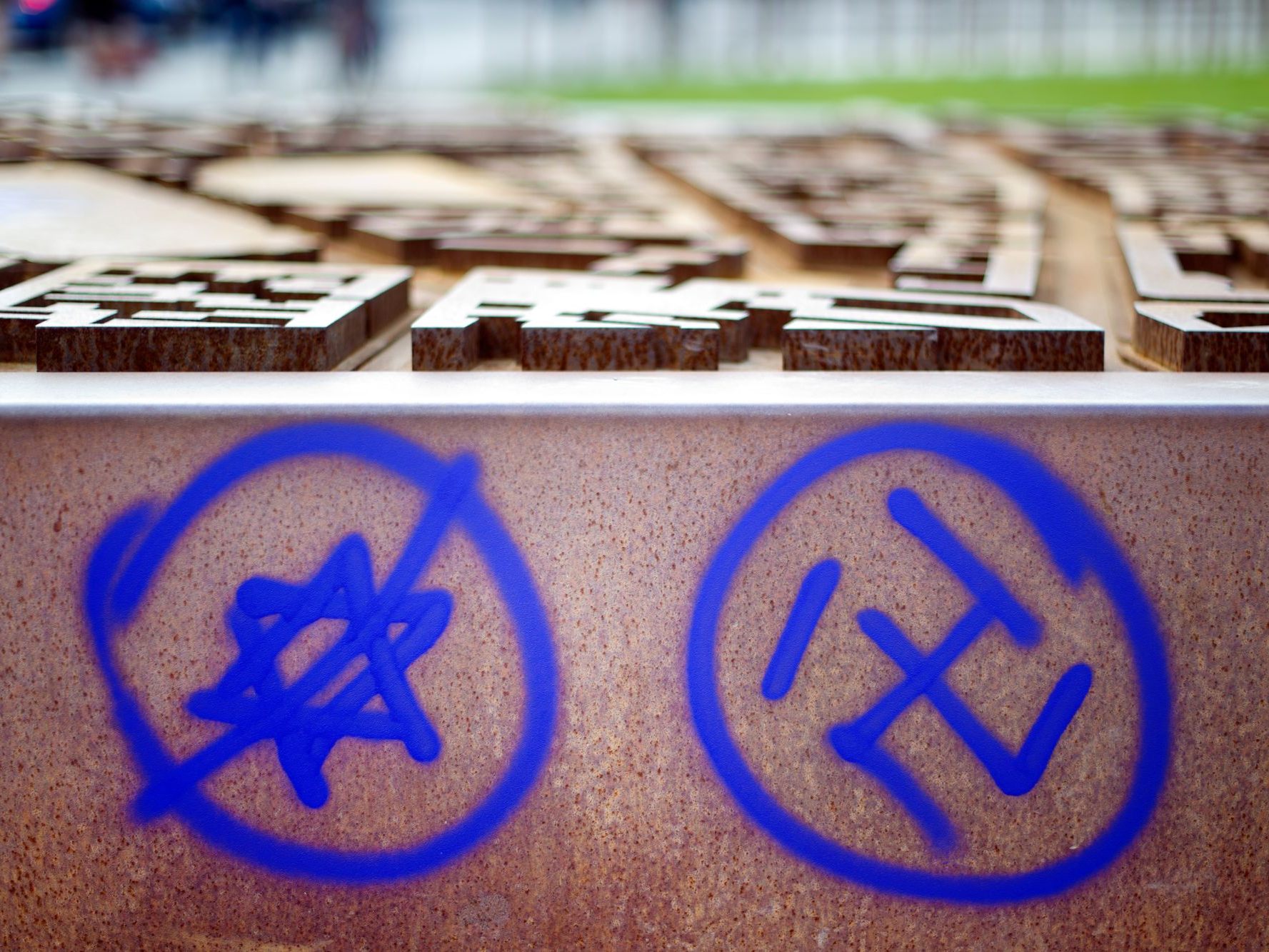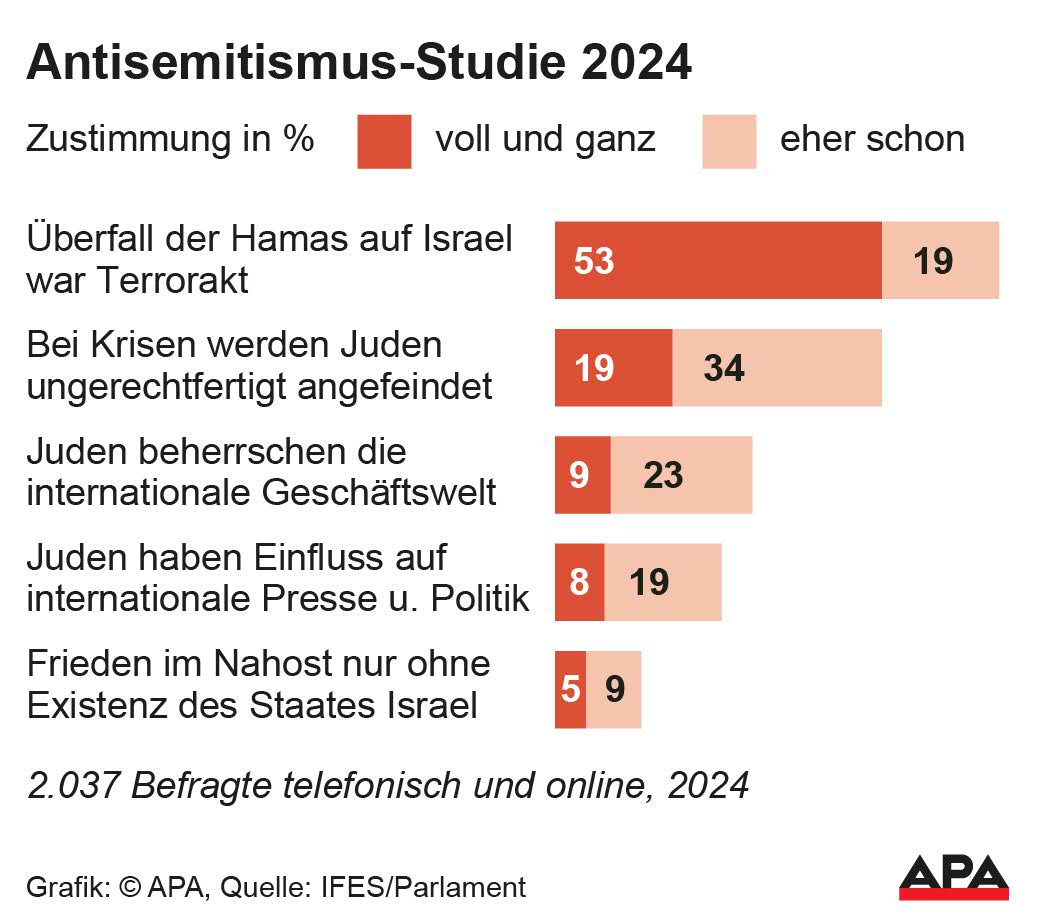Antisemitism is increasingly becoming a "youth" problem

For the study on antisemitism, which has been conducted every two years since 2018, a total of 2,037 people aged 16 and over across Austria were surveyed through telephone and online interviews in October and November of last year. An additional sample consisted of a total of 1,080 people, including 577 people with a Turkish migration background and 503 people with a migration background from an Arabic-speaking country.
Antisemitism more widespread among younger people
The study also shows stagnation and in some cases even slight declines in certain antisemitic attitudes: 13 percent of respondents continued to hold manifest antisemitic attitudes, compared to 15 percent in 2022. Latent antisemitism remained at the same level with 33 percent (2022: 32 percent). Conspiracy believers, people who know little about Judaism, and those with anti-American views were more likely to be antisemitic.

However, younger people stood out with more pronounced antisemitic attitudes, with higher formal education providing some protection against traditional antisemitism. Not only in relation to Israel-related antisemitism - especially after the Hamas terror attack on October 7, 2023 - but also in other statements, young people agreed more often than older ones. For example, about 15 percent of those under 25 believed that reports about concentration camps were often exaggerated. The statement "With the politics that Israel is doing, I can well understand why someone would have something against Jews" was agreed to completely or somewhat by 31 percent of respondents, an increase of eight percentage points. The statement "The Israelis basically treat the Palestinians no differently than the Germans treated the Jews in World War II" received more agreement with 35 percent (2022: 30 percent). For project coordinator Thomas Stern, such statements are "indeed a trivialization of National Socialism."
Arabic and Turkish descendants far more antisemitic
Antisemitism was far more pronounced, as it was two years ago, among the group with roots in Turkey or an Arabic-speaking country. And there were far more negative prejudices among people with strongly patriarchal thinking. But antisemitism is also increasing among people with a university degree. One cause - especially among younger people - is seen by Eva Zeglovits from IFES in media consumption. Young people hardly consume traditional media anymore, but mainly get their information from social networks, which often amplify conspiracy myths. The alarming results among young people represent a mandate for the education system, according to Stern. "Holocaust education needs to be completely rethought," he believes. Although Austria has done a lot in terms of teaching, "I believe it is no longer enough." It is the task of politics to ensure that the Holocaust and its effects up to the present are included in the curriculum, because: "Antisemitism lives on."
Rosenkranz Open to Holocaust Center
National Council President Rosenkranz also identifies "one thing or another that can be improved" in education about the Holocaust, not only in the education sector. He is also open to a Holocaust center desired by the Jewish Community of Vienna (IKG), which according to the government program should at least receive a feasibility study. For Stern, it is "very important to have a located opportunity, especially in Vienna." Rosenkranz expressed his pleasure that the Parliament's anti-Semitism study continues to be developed. "The fact is that anti-Semitism remains a persistent threat to the cohesion of society and our fundamental state values," warned the Freedom Party member.
Federal Government Concerned About Results of Anti-Semitism Study
State Secretary in the Federal Chancellery Alexander Pröll (ÖVP) sees the study's results as a wake-up call, particularly the increase in anti-Semitic prejudices against Israel is alarming. Accordingly, an adaptation of the national strategy against anti-Semitism is necessary. The further development of the strategy is also found in the government program. Through education and a clear political stance, anti-Semitism in all its forms should be consistently combated. For Integration Minister Claudia Plakolm (ÖVP), anti-Semitism contradicts the values of coexistence. The figures continue to show that there is an increasing problem with Muslim anti-Semitism, and its import should therefore be stopped. The federal government would already implement additional, concrete measures with the development of the anti-Semitism strategy, said Plakolm.
Interior Minister Gerhard Karner (ÖVP) emphasized that anti-Semitism would come from all political directions. It would be combated by the police and state protection, alongside preventive work in schools and associations, with all legally permissible means. Standing against anti-Semitism is a historical responsibility, also because it poses a threat not only to Jews but to society as a whole. State Secretary in the Ministry of the Interior Jörg Leichtfried (SPÖ) sees a connection between developments outside Europe and radicalization in Austria. Furthermore, patriarchal and authoritarian worldviews as well as conspiracy theories and anti-Semitism must be addressed on a societal level. The digital world offers fertile ground for the spread of misinformation, which must be consistently combated.
Education Minister Christoph Wiederkehr from the NEOS also sees anti-Semitism as a danger to society, which must be countered with high-quality educational work. This work would therefore include numerous initiatives that, among other things, aim to strengthen students in their democratic stance against anti-Semitism. Furthermore, as part of a scientific project, recommendations for schools on dealing with anti-Semitism would be developed. In the new nationwide strategy to combat anti-Semitism, prevention through education will also play a central role, said Wiederkehr.
(APA/Red)
This article has been automatically translated, read the original article here.





